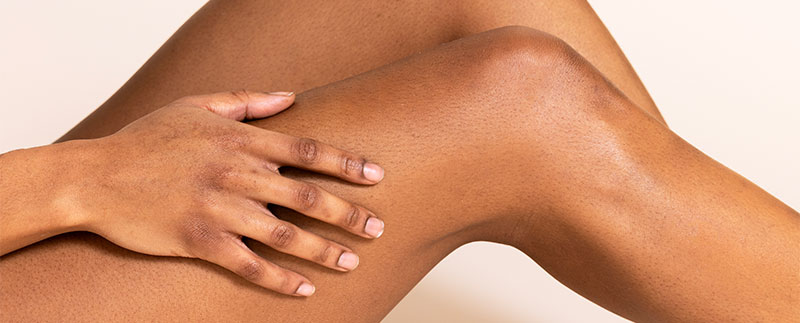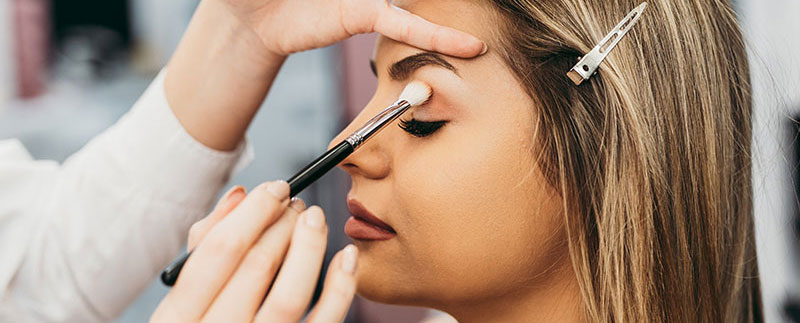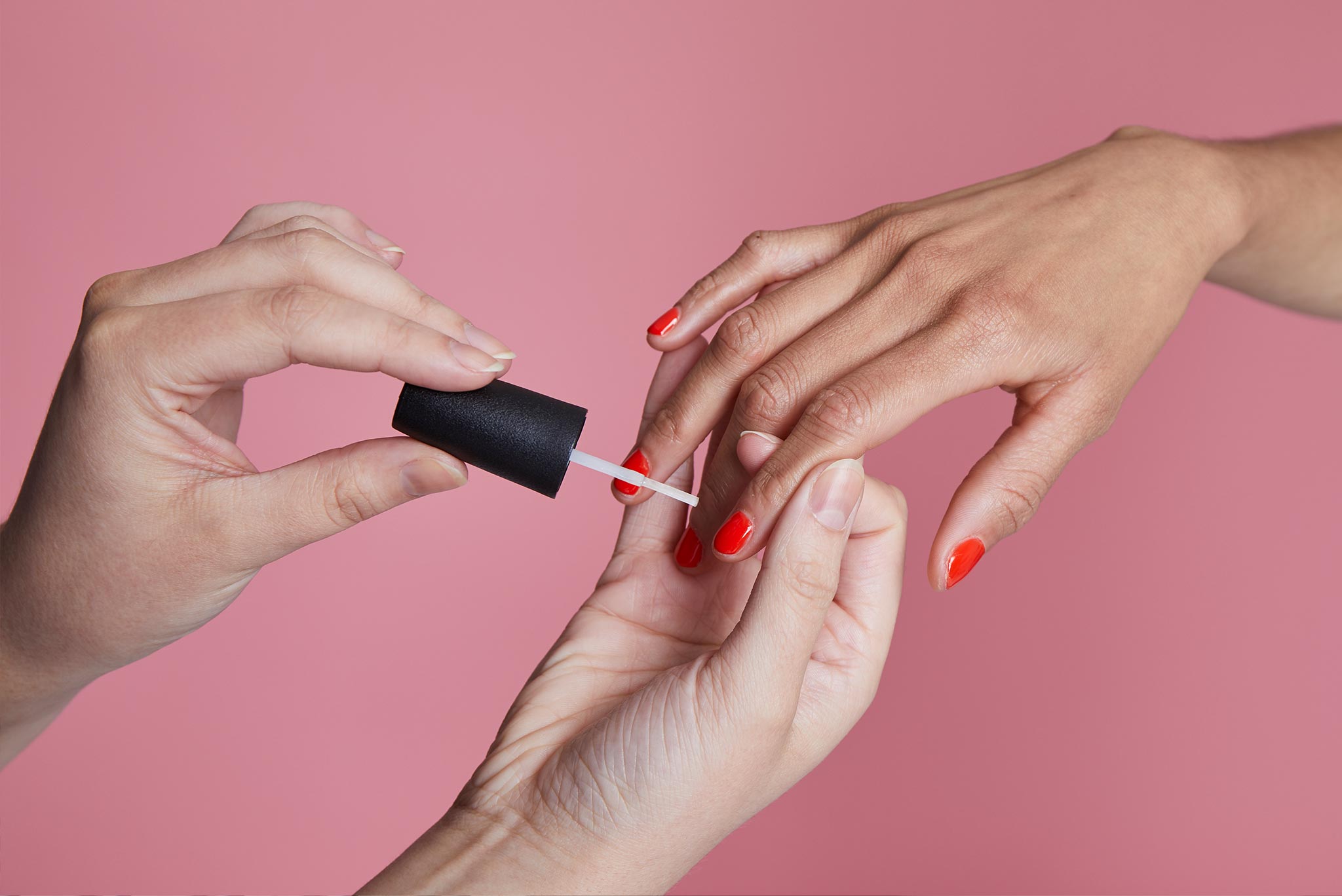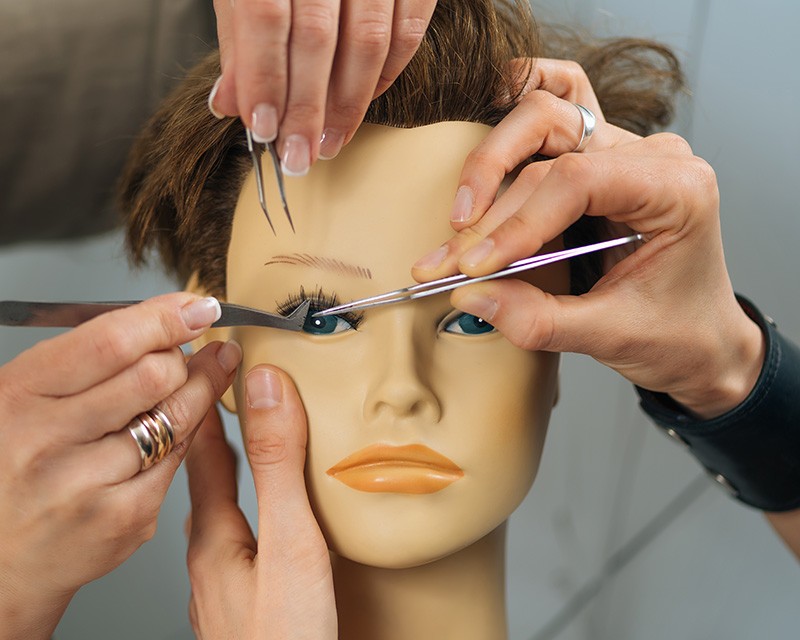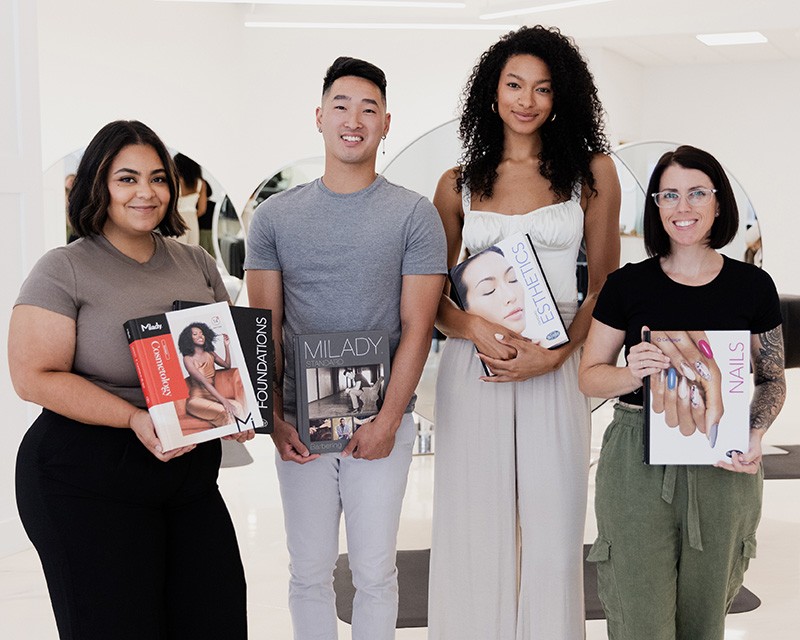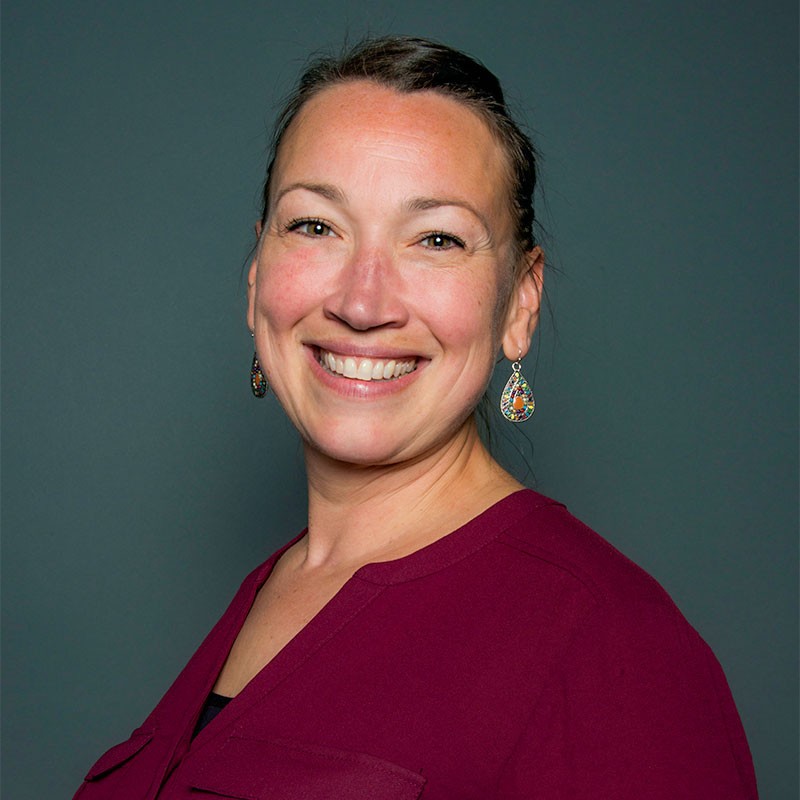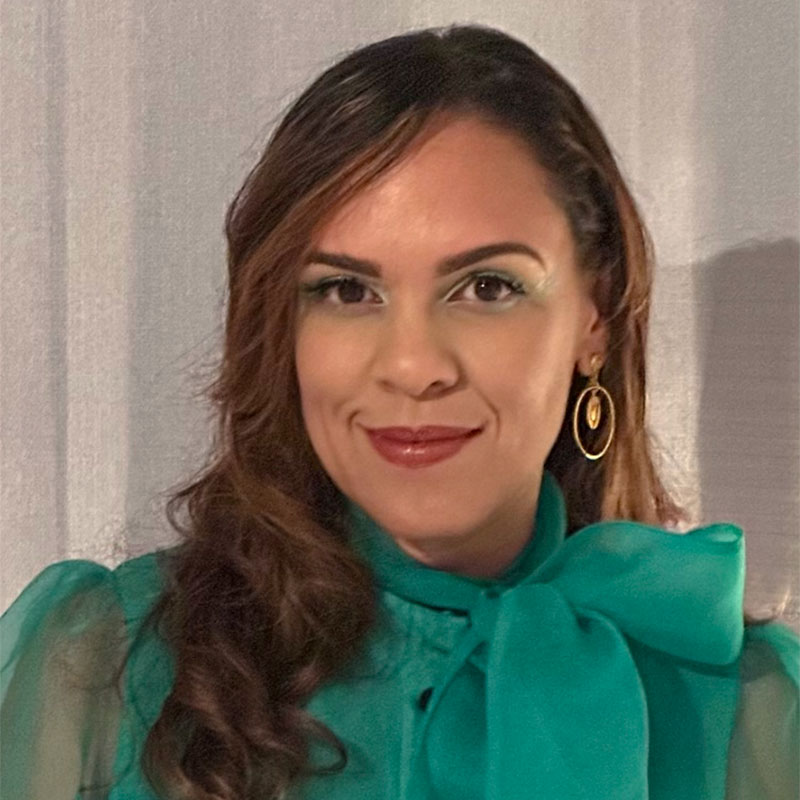18 Cosmetology Careers
Cosmetology careers go far beyond hair styling and makeup. With these 18 career options, cosmetologists can explore new opportunities beyond the salon.
Milady | May 26, 2023 | 12 min read

What careers do you think of when you hear the word cosmetologist? Maybe you think of a hairstylist or a makeup artist. However, there’s a little-known cosmetology fact: There are so many more careers to explore with a cosmetology license.
From hair specialists to estheticians to educators, licensed cosmetologists are not limited in their opportunities. The cosmetology world has four pillars — hair, skin, nails and makeup, and they’re just the beginning of cosmetology careers. While each pillar offers specialty opportunities, there are also plenty of opportunities for those who don’t want to work in a spa or salon.
In this article, we’ll explore the top 18 cosmetology careers and learn what a cosmetology license can do for you.
Table of contents
- Artistic director
- Admissions representative
- Barber
- Beauty editor
- Beauty industry software salesperson
- Blow dry bar hairstylist
- Braiding specialist
- Color specialist
- Cosmetology instructor
- Esthetician
- Hairstylist
- Hairstylist’s assistant
- Loctician
- Makeup artist
- Nail technician
- Natural hair specialist
- Salon and spa manager
- Salon and spa owner
- Cosmetology Careers FAQ
1. Artistic director
An artistic director in cosmetology oversees the creative aspects of salons and beauty companies. A significant part of their job is to stay up to date with the latest trends and techniques in hair and makeup and communicate this knowledge to their team.
Artistic directors train and mentor cosmetologists to provide them with the skills and knowledge they’ll use to create the best experiences for their clients.
Artistic directors in cosmetology need to have a strong background in the beauty industry and several years of experience working as a stylist or makeup artist. They should also have strong leadership skills, and the ability to manage a team and work collaboratively with other professionals in the industry.
2. Admissions representative
A beauty school admissions representative is responsible for recruiting and admitting students to a cosmetology program. They work for beauty schools and act as a liaison for prospective students, providing information about the program and answering students’ questions.
Some of the specific duties of a beauty school admissions representative may include:
- Recruiting students
- Evaluating applications
- Providing course information
- Enrollment assistance
Many admissions representatives for cosmetology schools attended cosmetology schools themselves. This makes them familiar with the program and can give the students firsthand information. In some cases, an admissions representative works for their alma mater.
3. Barber
A barber is a professional hairstylist who specializes in cutting and styling men’s hair and grooming facial hair. The key difference between a barber and a hairstylist is who they work on and a few of their services. While a hairstylist may choose to work with anyone, a barber only works with men’s hair. Additionally, a hairstylist wouldn’t save or groom facial hair, yet it is one of the main services that a barber offers.
While education and licensing requirements differ by state, all barbers must attend an accredited barber program, pass state board exams and receive a state license to practice. To further explore a career in barbering, check your state’s professional licensing information.
4. Beauty editor
Do you love skin, makeup, hair and nails and harness a talent and passion for writing? You might find a career as a beauty editor fulfilling. A beauty editor is a professional that works in journalism with a focus on all things beauty, skin care and wellness. They are responsible for creating, editing and curating content for various publications like magazines, newspapers and online platforms.
A beauty editor’s job is to keep up with the latest trends and developments in the beauty industry. From makeup trends to new nail products, beauty editors do their research by attending industry events, trying products and testing new techniques. They then report their findings in a column or article.
For a job in beauty editing, a degree in media, communications or journalism is often required. While not all beauty editors are cosmetologists, obtaining a cosmetology license can put you on an expedited path, as you will be an expert in the industry with a wide range of knowledge to share.
5. Beauty industry software salesperson
A beauty industry software salesperson sells software created for the beauty industry. This software includes everything from managing appointments to tracking inventory to analyzing customer data. These software services are essential for those who run businesses within the beauty industry.
As a salesperson, their main responsibility is to market and sell these software products to salon owners, makeup artists, estheticians and spa managers. They work to identify potential customers, understand their needs and demonstrate how the software will improve their business operations.
In addition to sales, beauty industry software salespeople also provide customer service and support.
6. Blow dry bar hair stylist
A blow dry bar hair stylist specializes in blowout styling for clients and walk-ins. Blowouts are styling services that create a voluminous look without cutting or coloring the hair.
Blowout specialists often work with clients who have a special event coming up that want their hair done in a specific way. These hair professionals are licensed cosmetologists who have strong technical skills in styling all hair lengths, textures and styles using the necessary tools and techniques.
7. Braiding specialist
A braiding specialist is a professional who can create a wide range of braided hairstyles and weave hair extensions into natural hair. Braiding specialists typically have extensive training and experience to create intricate, beautiful braids for their clients.
Some styles that a braiding specialist should master may include but are not limited to:
- Box braids
- French braids
- Cornrows
- Twist braids
Depending on your state’s requirements, braiding specialists may need either a cosmetology license or a specialized braiding license. If you’re interested in this career, check with your state’s professional licensing office for more information.
8. Color specialist
A color specialist is a professional hairstylist who focuses on coloring hair using complex techniques. A color specialist must have extensive knowledge of color theory and how certain hair types lift or take color.
These are the skills and techniques that all color specialists should possess:
- Overall hair coloring
- Bleaching and toning
- Highlights and lowlights
- Balayage and ombre effects
- Corrective color
- Color maintenance
- Vibrant colors
Color specialists often work in salons or as independent stylists. While it’s not required, many color specialists may also offer other hair services such as cutting and styling.
9. Cosmetology instructor
A cosmetology instructor is a licensed cosmetologist who trains and educates students in hair styling, coloring, cutting, makeup application, skin care, nail care and more. Cosmetology instructors are highly educated in their field and often choose one skill to specialize in and teach.
A cosmetology instructor’s primary responsibilities are developing and implementing lesson plans that cover the theory and practical application of their specialty. They will use lectures, demonstrations and hands-on activities to provide students with the knowledge and skills necessary to succeed.
They are also responsible for evaluating student performance and providing constructive feedback to help them improve their skills.
Cosmetology instructors are licensed educators in their respective fields that have additional education, experience and licensing. For more information on licensing requirements for cosmetology instructors, please visit your state’s website for licensed professionals.
10. Esthetician
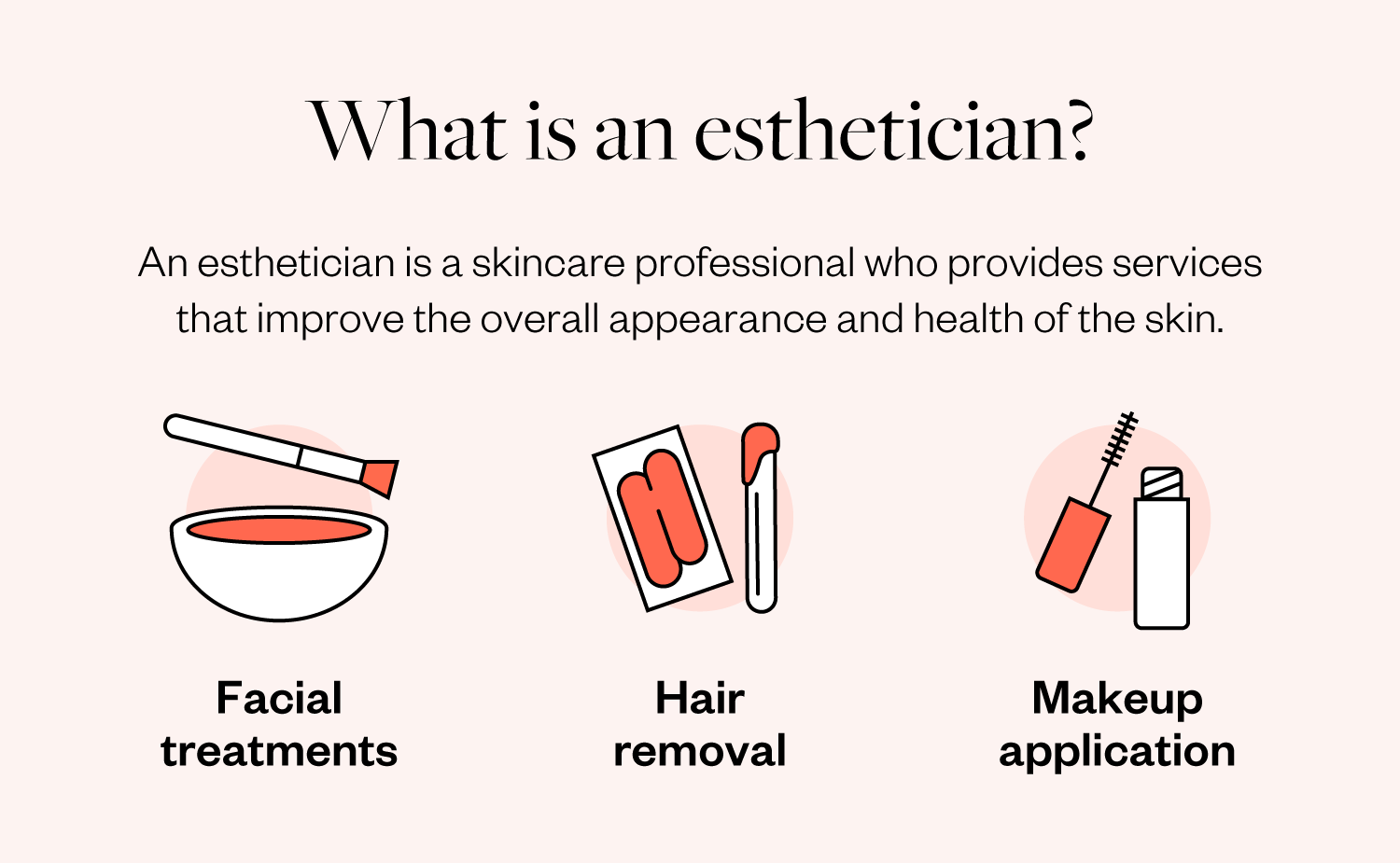
If you’re passionate about skincare, a job in esthetics may be right for you. Estheticians are skincare experts that provide a variety of services to improve the health of the skin. Estheticians typically work in spas, salons and medical offices and provide some of the following services:
- Facials
- Body treatments
- Hair removal
- Chemical peels
- Microdermabrasion
- Makeup application
Please note that additional training may be required to provide some of the above services.
While most states offer a separate esthetician’s license, many states allow cosmetologists to work as skin care specialists or estheticians. As always, check your state’s license to ensure you have the correct information and meet all the requirements before providing any additional services.
11. Hairstylist
If you’re passionate about all things hair, a career as a hairstylist is sure to fulfill your cosmetology dreams.
Hairstylists use the following skills to curate a specific look for their clients to help them feel their best:
- Hair cutting
- Trimming
- Texturizing
- Extensions
- Coloring
- Chemical services
A hairstylist has the most opportunities in a salon setting, but you can find hair stylists working in fashion, entertainment, barbershops, cosmetics and spas.
To become a hairstylist, you must complete an accredited cosmetology program, pass state board exams and obtain state licensure. Many cosmetology programs allow you to specialize in a specific area to focus on hair during your education. Once you achieve state licensure, you can legally work in your state as a salon employee or even work for yourself.
12. Hairstylist’s assistant
A hairstylist’s assistant is a licensed professional that provides support to a hairstylist. The assistant’s main responsibility is to help the hairstylist perform their job more efficiently.
The job duties of a hairstylist assistant may include:
- Greeting and preparing clients for appointments
- Shampooing and conditioning hair
- Mixing hair color
- Applying products
- Managing equipment
- Stocking supplies
- Washing towels and capes
- Scheduling appointments
- Completing other administrative tasks
Working as a hairstylist’s assistant can be a great way to gain valuable experience and knowledge in the beauty industry and build relationships with clients and other beauty professionals.
13. Loctician
A loctician creates, maintains and styles dreadlocks. Locticians have extensive training and experience in the techniques that create and care for locks.
To become a loctician, you must learn and demonstrate the following skills:
- Starting dreadlocks
- Dreadlock maintenance
- Dreadlock repairing
- Styling
- Coloring techniques
Similar to a braiding specialist, licensing requirements vary by state. While some states may require a braiding license or a full cosmetology certification, there are a few states that do not currently require a special license to practice. Even in states where professional licensure isn’t required, it’s still wise to take classes or earn a certification so you can demonstrate mastery of the above skills.
14. Makeup artist
If you love expressing yourself through makeup and art, a job as a makeup artist is a fulfilling and exciting career for many. Makeup artists are responsible for applying makeup to clients to create a desired look. They must be able to create a variety of makeup styles, from natural and subtle to bold and dramatic, depending on the occasion and the client’s preferences.
Makeup artists may work in various places, from spas and salons to behind-the-scenes of major movie, stage or TV productions. Many makeup artists work freelance by offering their services for special events like weddings, fashion shows, proms and more.
Many makeup artists also offer product recommendations and teach their clientele how to properly apply makeup for everyday looks.
To become a makeup artist, you must graduate from a makeup artistry or cosmetology program and meet all the requirements to obtain state licensure. To work in the entertainment industry, you may need to seek out an apprenticeship in performance makeup art.
15. Nail technician
Nail technicians provide nail care services such as manicures and pedicures. These services require cleaning, shaping and buffing nails then applying nail polish, acrylics, gel polish and other nail enhancements. Nail techs also create nail art through hand-painted designs, rhinestones, glitter and other decorative elements.
To become a nail technician, you typically need to complete a training program through a cosmetology school and obtain a state license. A nail technician training program covers topics such as nail anatomy, product knowledge, safety and sanitation and business practices.
16. Natural hair specialist
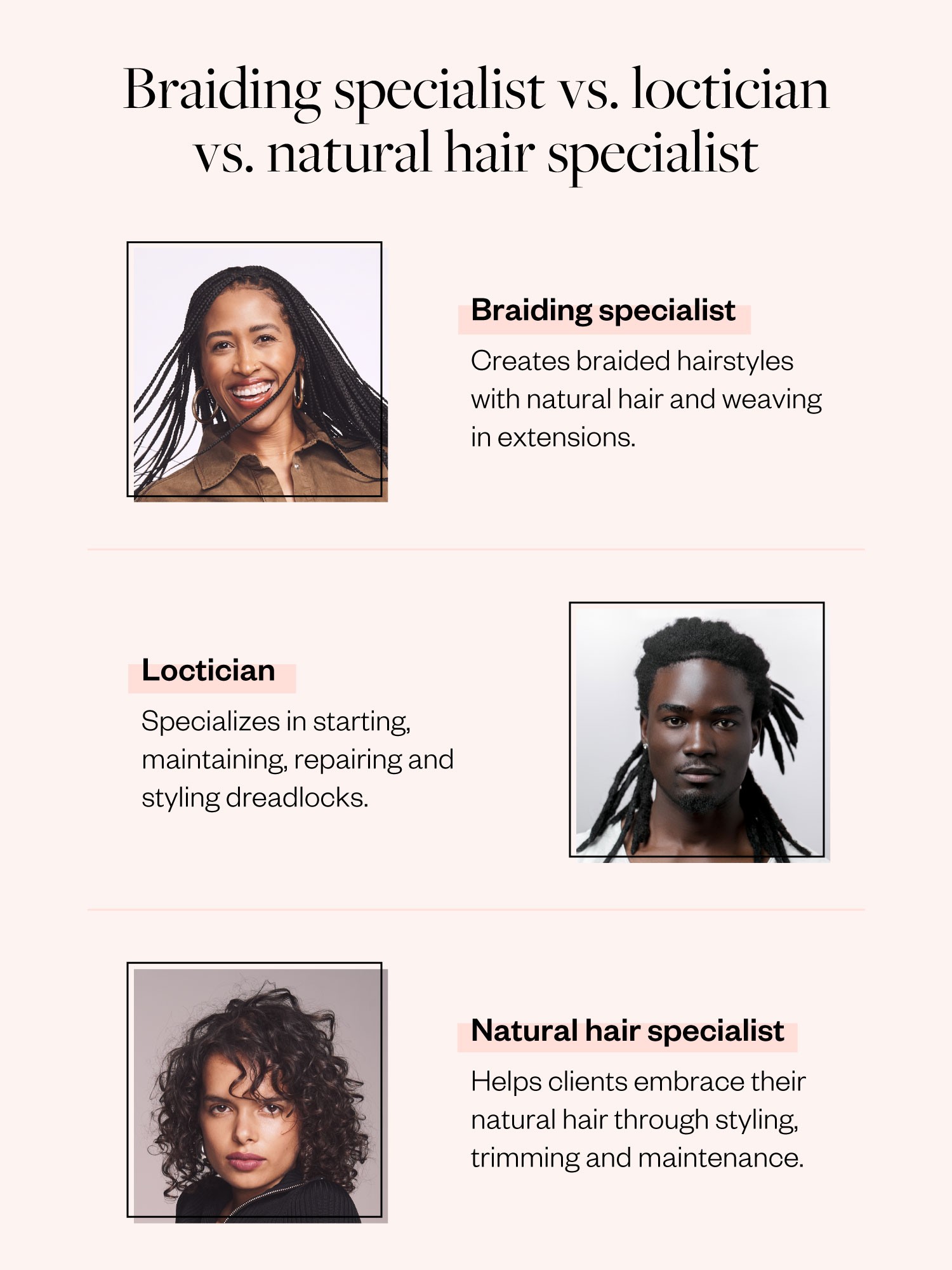
Natural hair specialists help their clients embrace their natural hair’s texture without the use of chemicals and perming techniques. A natural hair specialist typically works with clients that have wavy, curly and coily hair to trim, style and maintain the hair. Another important part of a natural hair professional’s job is coaching their clients and teaching them how to care for and style their hair at home.
Natural hair specialists must hold a license to practice after completing a cosmetology program and passing state board exams. If you’re interested in working with natural hair, look for a school that offers this type of class.
17. Salon and spa manager
With a cosmetology license and a strong sense of leadership, a salon or spa manager’s responsibilities include staff management, business operations, marketing and sales, retail management and more. As a salon manager, your job is to manage the daily operations of the salon or spa to keep the business running efficiently.
Salon and spa managers are often licensed cosmetology professionals that have a background in the industry. Having a cosmetology license as a manager allows you to understand your staff’s needs and the standards in which salon or spa operations.
18. Salon or spa owner
After years of experience in the beauty industry and building a stable clientele, many cosmetologists dream of opening a salon or spa.
As a business owner, duties vary day-to-day, depending on the size of the business and who you hire.
The responsibilities a salon business owner undertakes may include but are not limited to:
- Budgetary planning
- Client management
- Business planning
- Marketing and promotion
- Facility management
- Staff training and development
- Financial management
While a business owner may hire a manager to assist with the above duties, a successful owner is organized, detail-oriented and understands the beauty industry. Salon and spa owners may also continue to perform services for a select number of clients.
Cosmetology Careers FAQ
Are you considering a career in cosmetology but still have some lingering questions? No problem! We’re here to answer some of the most frequently asked questions about cosmetology careers.
What are the top three industries that employ cosmetologists?
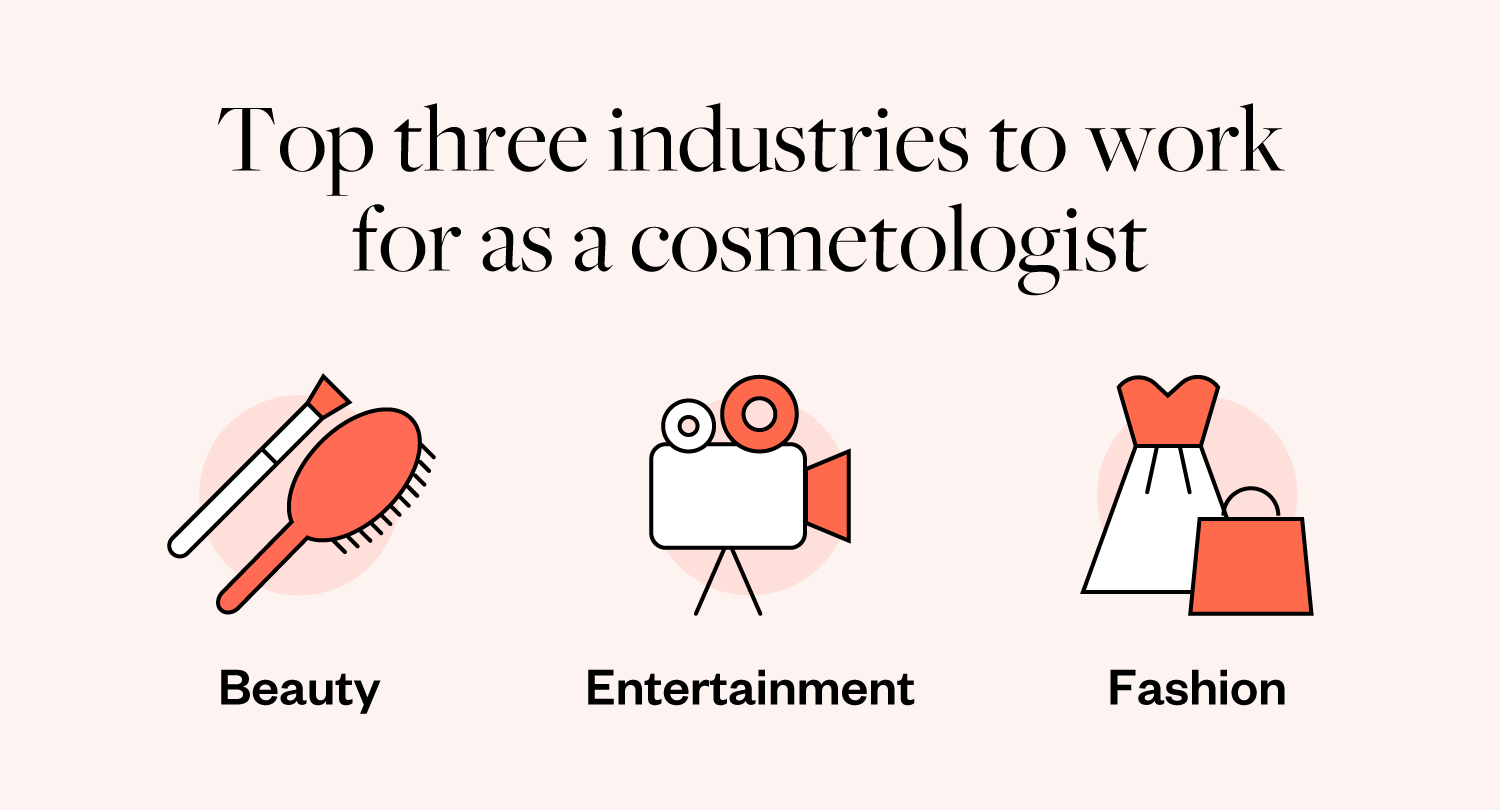
A licensed cosmetologist has career opportunities in various industries doing a handful of jobs. Yet it’s no surprise that most beauty careers are found among industries that require hair and makeup daily. Here are the top three industries in which cosmetologists work:
- Beauty: Many cosmetology school graduates and license holders choose to work at a salon or spa where they can cater to a wide range of clients. In many cases, cosmetologists who work at salons and spas, rent their own booths and work for themselves.
- Entertainment: Hair and makeup artists often work in the entertainment business by offering their services to actors and artists in movies, television, theater and music.
- Fashion: Cosmetologists are an integral part of the fashion industry as they use their expertise to create hair and makeup looks for photoshoots and fashion shows.
What is an example of a career option in the cosmetology field?
A cosmetologist has the opportunity to work with skin, nails, hair and makeup. It’s most common for cosmetologists to work in a salon or spa performing services for their clients.
While there are dozens of careers a cosmetologist can explore, many of their careers fit under one of the following categories:
- Hairstylist
- Esthetician
- Makeup artist
- Nail technician
If a cosmetologist is looking for a career shift away from the chair, they might consider one of the following jobs:
- Educator or trainer
- Artistic director
- Salon and spa marketing manager
- Beauty editor
What field of cosmetology pays the most?
Many fields and opportunities within cosmetology offer great pay and benefits. Yet working in the entertainment industry as a makeup artist or hairstylist often pays the most as you’d be working in a fast-paced, competitive and highly complex environment.
According to the Bureau of Labor Statistics, theatrical and performance makeup artists make are the highest-earning cosmetologists. But it’s not the only job in cosmetology that offers great pay and benefits. According to a study conducted by the Qnity Institute, the average cosmetologist earns $54,307 a year while working part-time schedules.
Earnings for a career in professional beauty according to Quinty:
- Cosmetologists earn an average hourly rate of $38.37, or $79,807 when accounting for a 40-hour workweek.
- 24% of cosmetologists surveyed earn over $100,000 a year.
- New cosmetologists (one to three years in the industry) who work 40 hours a week make an average salary of $59,946.
Whether you’re considering cosmetology school, thinking about a career change or looking into further education, the Milady newsletter has all the career advice and educational materials you need to stay up to date on all things beauty. Sign up for the Milady newsletter today for cosmetology news and resources right to your inbox.
Ready to take the first step towards an exciting and rewarding career in the beauty industry?
Sign up for the Milady email list. As a subscriber, you’ll get a sneak peek into the world of beauty and all the possibilities that await you. Don’t miss out on this opportunity to stay in the know and start your journey towards a brighter future today.
"*" indicates required fields

About Milady
Milady is on a mission to prove that a career in the beauty industry can lead to professional success and personal fulfillment. Our job is to create forward-thinking education that reshapes the industry and uplifts the next generation of beauty professionals. Let’s change the face of beauty. Learn more about Milady, here.

